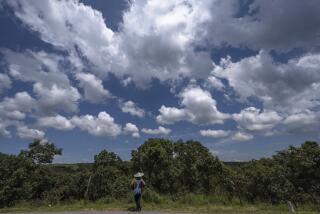Blight Knows No Border, Clan Leader Says : Environment: Spiritual leaders of indigenous people will attend a global conference in Moscow on protecting the Earth from pollution.
NEW YORK — When a city dumps its sewage into an adjacent river, pollution not only affects it but other cities down the river. Each adds to the blight.
“We’re going to pay a penalty,” says Chief Oren Lyons, an American Indian spiritual leader, in sketching that image of the cumulative effects of despoiling nature.
“All these currents in the world, the air, the water, the currents of life on land, the wind, even the Earth we travel on, are moving and they don’t recognize any borders,” he said.
Lyons of Onondaga, N.Y., is one of a score of indigenous spiritual leaders from many lands participating in an international conference next week in Moscow on protecting the environment.
“There are natural laws that govern the air, that govern the land and govern the water, and it behooves us to know what those laws are if we’re going to survive. You can’t argue with natural laws. If we keep violating them, we won’t survive.”
Close to Nature
Lyons, 59, a clan chief of the Onondaga branch of the Iroquois and director of an American Indians studies program at the State University of New York at Buffalo, said Indians are especially attuned to life’s basis in nature.
“Indians and other indigenous people have lived in nature, close to the earth, and understand its wisdom and laws,” he said. “That wellspring philosophy needs to be brought to the world.”
Efforts to do that are planned at a “Global Forum on Environment and Development for Survival” in Moscow Monday through Friday, involving religious leaders, legislators and scientists from around the world.
Several scientists and members of Congress are among the 200 registered participants, about half of them representing Christianity, Judaism, Islam, Hinduism and Buddhism.
About a fifth of the religious contingent is made up of spiritual leaders of the Americas, Africa, Australia and Pacific islands.
“It’s the first time we’ve been able to get ourselves together for this broad a representation,” said Lyons, a member of the conference steering committee.
“Indigenous people have a long-term moral perspective on the Earth and its life. We have no complex answers, but only the simple principle of respect for all life, for the trees, the rivers, the fish, the animals.
Simple Rules
“The world is very complex today, but values still remain simple, the principles of life remain simple. If we break those rules of life and procreation, we break the cycle of life, and life will disappear.
“The Earth will not disappear, but people will. We’re not going to destroy the world. The world has its own time cycle. But we are still only a biological experiment.
“At one time, the Earth had great dinosaurs, but they are not here anymore. It could be that one time people will not be here anymore. That’s up to us, and the directions we take.”
The Moscow conference opens with an address by U.N. Secretary General Javier Perez de Cuellar. Soviet President Mikhail S. Gorbachev is scheduled to address its closing session.
It is the second such conference for the New York-based Global Forum; the first took place in 1988 at Oxford University. In a rare partnership, Soviet churches and the first freely elected Supreme Soviet are co-hosting the affair.
Lyons said the American Indian’s affinity with nature needs to “be transferred to the public at large.”
“Our ceremonies” have kept that perspective alive, he said. “They’re ingrained as part of life. We celebrate the sacredness of the Earth in a year-round cycle of ceremonies expressing respect and gratitude for it.”
Human links with it derive from “the Creator,” Lyons said. “If we go contrary to his rules for it, we’re certainly going to suffer. We don’t own the land. We borrow it from the future.
“But we are accountable for the future.”
Time itself is involved, he said. A chain saw can cut a 500-year-old tree in 10 minutes, he noted, but machines can’t make another like it grow to maturity.
“This is a taking technology without a giving side to it,” he said. “That’s what has to be adjusted. People have a voracious appetite, but they’re not exempt from the natural law or its consequences.”
More to Read
Sign up for Essential California
The most important California stories and recommendations in your inbox every morning.
You may occasionally receive promotional content from the Los Angeles Times.










